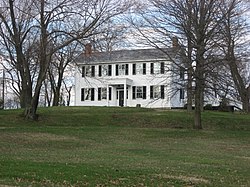James Beach Clow House
James Beach Clow House | |
 Front of the Clow House | |
| Location | Chapel Dr. at Ann St., Ellwood City, Pennsylvania |
|---|---|
| Coordinates | 40°49′33″N 80°15′32″W / 40.82583°N 80.25889°W |
| Area | 5.7 acres (2.3 ha) |
| Built | 1830 |
| Architectural style | Greek Revival |
| NRHP reference No. | 89000349[1] |
| Added to NRHP | May 17, 1989 |
The James Beach Clow House is a historic house in northern Beaver County, Pennsylvania, United States. Located in North Sewickley Township near the community of Ellwood City,[2]: 1 the house is a rare surviving example of 19th-century Greek Revival farmhouses in Beaver County.
The Clow House was built circa 1830 by War of 1812 veteran James Beach Clow, a native of Pitt Township in Allegheny County, upon land that he bought in 1821. A leading man in his community, Clow served as justice of the peace in eastern Beaver County in 1830. Besides his position as a "gentleman farmer", Clow was an industrialist, holding a share in a sawmill near his farm. He sold the property to his son Samuel in 1844, but continued to live in the house until his death ten years later.[2]: 7 Although the house remained Samuel's home until his death in 1893, it was also a dormitory for students attending a school across the road during most of the 1870s. After the deaths of Samuel and his widow, the property passed through several different owners before farming ended in 1950.[2]
Besides the house, early buildings on the property include an original outhouse and a spring house. The property also included an early barn and miscellaneous multi-purpose building, but these two structures were removed in 1959.[2]: 2 Today, the house lies along Chapel Drive southeast of Ellwood City; its prominent hilltop location makes it visible to the south and east to a distance of several miles. Although a modern residential subdivision is located along Chapel immediately to the north of the Clow property, it retains much of its historic integrity amid a primarily rural setting.[2]: 2, 3, 14 This places it in contrast with most period wooden Greek Revival farmhouses in rural Beaver and Lawrence counties: nearly all surviving examples of this type of architecture have been heavily modified.[2]: 6 Only one other Greek Revival house in Beaver County is listed on the Register — the William B. Dunlap Mansion in the borough of Bridgewater in the central part of the county — and the county's only other 19th-century farmhouse on the Register is the David Littell House in the county's far south.[1]
References
[edit]- ^ a b "National Register Information System". National Register of Historic Places. National Park Service. March 13, 2009.
- ^ a b c d e f Schry, Frederick L. National Register of Historic Places Inventory/Nomination: James Beach Clow House. National Park Service, 1988-05-25. Accessed 2009-12-17.
Further reading
[edit]- Caldwell, J. A. 1876 Illustrated Historical Centennial Atlas of Beaver County, Pennsylvania. Pittsburgh: Otto Krebs, 1876.
- The Western Argus and Farmers Mechanics Register. Beaver: n.p., 1830.


